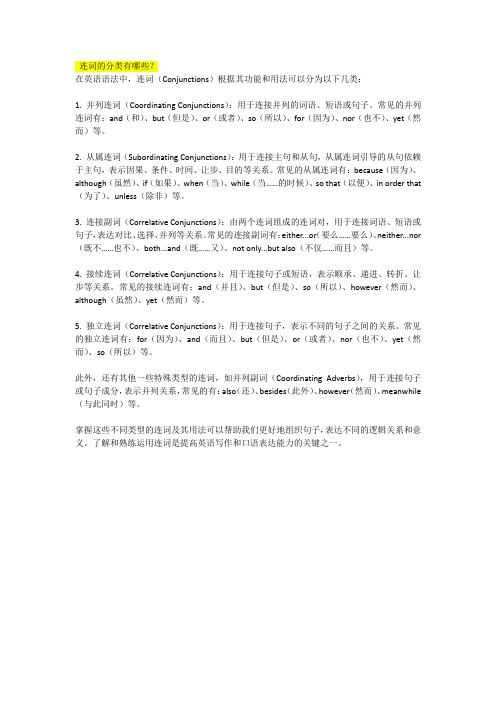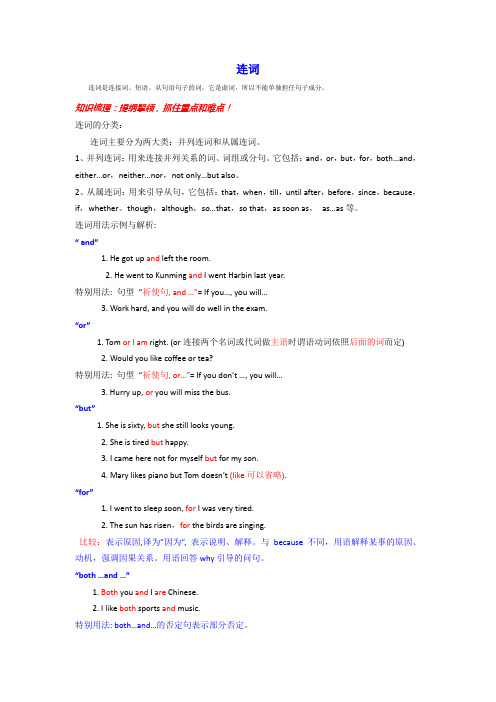2020年中考英语连词复习:从属连词的分类
英语从属连词用法分类详解

1.1表示“当…时候”或“每当”的时间连词;主要的 when, while, as, whenever:He jumped up when the phone rang. 电话铃响时他吓了一跳;We listened while the teacher read. 老师朗读时我们听着;The phone rang just as I was leaving. 我正要离开,电话铃就响了起来;2表示“在…之前或之后”的时间连词;主要的有before, after:Turn the lights off before you leave. 离开前请关灯;He started the job soon after he left the university. 他大学毕业后就开始做这份工作;3表示“自从”或“直到”的时间连词;主要的有since, until, till:He has lived here since he got married. 他结婚后就一直住在这儿;Most men worked until till they’re 65.大多数男人工作到65岁;4表示“一…就”的时间连词;主要的有as soon as, the moment, the minute, the second, the instant, immediately, directly, instantly, once, no sooner…than, hardly…when等:Tell him the news as soon as you see him. 你一见到他就把这消息告诉他;I recognized her the moment that I saw her. 我一看到她就认出她来了;I want to see him the minute that he arrives. 他一到来我就要见他;I went home directly I had finished work. 我一干完活就回家了;Once he arrives, we can start. 他一来我们就可以开始;5表示“上次”、“下次”、“每次”等的时间连词;主要的有every time每次,each time每次,the next time下次,any time随时,the last time上次,the first time第一次:Last time I saw him, he looked ill. 上次我见到他的时候,他好像有病;Next time you’re in London come and visit us.你下次来伦敦过来探望我们;Do look me up next time you’re in London.你下次到伦敦来,一定来找我;Every time I call on him, he is out. 我每次去访问他,他都不在;You can call me any time you want to. 你随时都可以给我打电话;注every time, each time, any time前不用冠词,the next time, the last time中的冠词可以省略,而the first time中的冠词通常不能省略;2.这类连词主要有if, unless, as so long as, in case 等:If anyone calls tell them I’m not at home.要是有人打电话来,就说我不在家;You will fail unless you work hard. 你若不努力就会失败;As So long as you need me, I’ll stay.只要你需要我,我就留下;In case I forget, please remind me about it. 万一我忘记,请提醒我一下;注在条件状语从句中,通常要用一般现在时表示将来意义,而不能直接使用将来时态;不过,有时表示条件的 if之后可能用 will,但那不是将来时态, 而是表示意愿或委婉的请求will 为情态动词:If you will wai t a moment, I’ll fetch the money.请等一下,我就去拿钱;3.主要的有 in order that, so that, in case, for fear等:We used the computer in order that we might save time. 我们使用计算机是为了节约时间;Speak clearly so that they may understand you. 说清楚,以便让他们能明白你的意思;Be quiet in case you should wake the baby. 安静些,免得把婴儿吵醒;He is working hard for fear he should fail. 他努力工作以免会失败;4.主要的有so that, so…that, such…that等:We’re all here now, so that the meeting can begin at last.我们现在都到齐了,终于能开会了;It’s so difficult a question that none of us can a nswer it. 那是一个很难的问题,我们没有一个人能回答;He shut the window with such force that the glass broke. 他关窗户用力很大,结果玻璃震破了;注so that 中的that在口语中通常可以省略;5.主要的有because, as, since, seeing that, now that, considering that 等:He couldn’t got to school because he had a cold.他因患感冒而未能去上学;Since everybody is here, let’s begin our discussion.大家都到了,我们就开始吧;Seeing that it is 8 o’clock, we’ll wait no longer.由于时间已到8点,我们将不再等了;Now that you are here, you’d better stay.你既然来了,最好还是留下吧;6.主要的有although, though, even though, even if, while, however, whatever, whoever, whenever, wherever等:Although Though he is poor, he is well contented. 他虽穷却能知足常乐;Though Even though it’s hard work, I enjoy it.尽管是苦活,但我乐意干;Even if you don’t like wine, try a glass of this.即使你不喜欢喝酒,也尝尝这杯吧;While we don’t agree we continue to be friends. 尽管我们意见不同,但我们还是朋友;However you use it, it won’t break.不管你怎么使用,它都不会破;Whatever you say, I believe you. 无论你说什么,我都相信你;Whoever telephones, tell them I’m out.不管是谁打电话,都说我出去了;Whenever you come, you are welcome. 你什么时候来,我们都欢迎;However much he eats, he never gets fat. 无论他吃多少, 他都不发胖;7.主要的有as, like, as if, as though, the way等:Do it as like he does. 像他那样做;He behaved as if nothing had happened. 他装作若无其事的样子;They treat me as though I were a stranger. 他们待我如陌生人;Nobody else loves you the way=as I do. 没有人像我这样爱你;8.主要的有where, wherever, everywhere等:There were lots of parks where I lived. 我住的地方有许多公园;Sit wherever you like. 你想坐在那儿就坐在那儿;Everywhere they went, they were warmly welcomed. 他们每到一个地方都受到热烈欢迎;9.主要的有than和as…as:It’s easier t han I thought. 这比我想像的要容易;They are as often wrong as they are right. 他们错对各半;10.主要的有that, if, whether:It is clear enough what he meant. 他是什么意思很清楚;Your greatest fault is that you are careless. 你最大的缺点是粗心大意;Whether it will do us harm remains to be seen. 是否对我们有害还要看一看; She didn’t say if he was still alive.她没说他是否还活着;。
连词的分类有哪些

连词的分类有哪些?在英语语法中,连词(Conjunctions)根据其功能和用法可以分为以下几类:1. 并列连词(Coordinating Conjunctions):用于连接并列的词语、短语或句子。
常见的并列连词有:and(和)、but(但是)、or(或者)、so(所以)、for(因为)、nor(也不)、yet(然而)等。
2. 从属连词(Subordinating Conjunctions):用于连接主句和从句,从属连词引导的从句依赖于主句,表示因果、条件、时间、让步、目的等关系。
常见的从属连词有:because(因为)、although(虽然)、if(如果)、when(当)、while(当……的时候)、so that(以便)、in order that (为了)、unless(除非)等。
3. 连接副词(Correlative Conjunctions):由两个连词组成的连词对,用于连接词语、短语或句子,表达对比、选择、并列等关系。
常见的连接副词有:either...or(要么……要么)、neither...nor (既不……也不)、both...and(既……又)、not only...but also(不仅……而且)等。
4. 接续连词(Correlative Conjunctions):用于连接句子或短语,表示顺承、递进、转折、让步等关系。
常见的接续连词有:and(并且)、but(但是)、so(所以)、however(然而)、although(虽然)、yet(然而)等。
5. 独立连词(Correlative Conjunctions):用于连接句子,表示不同的句子之间的关系。
常见的独立连词有:for(因为)、and(而且)、but(但是)、or(或者)、nor(也不)、yet(然而)、so(所以)等。
此外,还有其他一些特殊类型的连词,如并列副词(Coordinating Adverbs),用于连接句子或句子成分,表示并列关系,常见的有:also(还)、besides(此外)、however(然而)、meanwhile (与此同时)等。
英语连词的分类

英语连词的分类
英语连词的分类如下:
1.并列连词:用来连接并列的单词、短语、从句或句子。
例如:and、or、
but、so、for等。
2.从属连词:用来引导从句,如名词性从句(主语从句、宾语从句、表语从
句等)、定语性从句(限制性定语从句和非限制性定语从句)和状语性从句(时间状语从句、地点状语从句、条件状语从句等)。
例如:that、which、who、whom、whose、when、where、why等。
3.短语连词:指用来连接两个或多个短语或子句的连词。
例如:in order to、
in case of、on condition that等。
4.替代连词:用来替代某个单词或短语,避免重复。
例如:one、that、so等。
5.限定连词:用来限定句子中的某个成分,使其表达更加精确或完整。
例如:
only、just、even等。
6.因果连词:用来表示原因和结果的连词。
例如:because、since、as a result
of等。
7.让步连词:用来表示尽管某种情况存在,但另一件事情仍然发生或成立的
连词。
例如:though、even if、even though等。
8.条件连词:用来表示某种条件下的情况的连词。
例如:if、unless、as long
as等。
9.时间连词:用来表示时间先后顺序的连词。
例如:when、after、before等。
10.地点连词:用来表示地点位置关系的连词。
例如:where、wherever等。
中考英语语法总结-连词

连词连词是连接词、短语、从句语句子的词,它是虚词,所以不能单独担任句子成分。
知识梳理:提纲挈领,抓住重点和难点!连词的分类:连词主要分为两大类:并列连词和从属连词。
1、并列连词:用来连接并列关系的词、词组或分句。
它包括:and,or,but,for,both…and,either…or,neither…nor,not only…but also。
2、从属连词:用来引导从句,它包括:that,when,till,until after,before,since,because,if,whether。
though,although,so…that,so that,as soon as,as…as等。
连词用法示例与解析:“ and”1. He got up and left the room.2. He went to Kunming and I went Harbin last year.特别用法: 句型“祈使句, and …”= If you…, you will…3. Work hard, and you will do well in the exam.“or”1. Tom or I am right. (or连接两个名词或代词做主语时谓语动词依照后面的词而定)2. Would you like coffee or tea?特别用法: 句型“祈使句, or…”= If you don’t …, you will…3. Hurry up, or you will miss the bus.“but”1. She is sixty, but she still looks young.2. She is tired but happy.3. I came here not for myself but for my son.4. Mary likes piano but Tom doesn’t (like可以省略).“for”1. I went to sleep soon, for I was very tired.2. The sun has risen,for the birds are singing.比较:表示原因,译为”因为”, 表示说明、解释。
英语连词的分类及用法

英语连词的分类及用法连词是连接词组、短语或句子的词语。
在英语中,有不同类型的连词,每种类型都有特定的用法和功能。
下面将介绍英语连词的分类及其常见的用法。
1. 并列连词 (Coordinating Conjunctions)并列连词用于连接同等级的词组、短语或句子。
常见的并列连词有以下几种:- and:表示并且,用于列举相似、相关或相等的事物。
- or:表示或者,在两个或多个选择之间做出选择。
- but:表示但是,用于对比或引出相反的情况。
- so:表示因此,用于给出结果或原因。
- for:表示因为,用于解释原因或提供理由。
并列连词的使用可以让句子更加清晰明了,同时能够增加句子的连贯性。
2. 从属连词 (Subordinating Conjunctions)从属连词用于连接主句和从句,从属连词使从属从句依赖于主句。
常见的从属连词有以下几种:- because:表示因为,用于陈述原因。
- if:表示如果,用于表示假设或条件。
- while:表示当…时候,用于描述两个同时发生的动作或事件。
- before:表示在…之前,用于表示时间先后关系。
- after:表示在…之后,用于表示时间先后关系。
从属连词的正确使用可以帮助构建更复杂的句子结构,并表达出更多的语义意义。
3. 连接副词 (Conjunctive Adverbs)连接副词用于连接独立的句子或在句子中起到过渡作用。
常见的连接副词有以下几种:- however:然而,用于表示转折或对比。
- therefore:因此,用于表示结果或结论。
- moreover:此外,用于表示补充信息。
- nevertheless:然而,用于表示对比或相反情况。
连接副词的使用可以使句子结构更加多样化,使文章更具有连贯性和逻辑性。
4. 瞬间连词 (Correlative Conjunctions)瞬间连词由两个相互关联的词语组成,用于连接并列的词组、短语或句子。
常见的瞬间连词有以下几种:- both...and:既...又,用于列举两个相似或相关的事物。
英语从属连词用法分类详解

从属连词1. 引导时间状语从句的从属连词(1)when while “当…时候”“每当”:He jumped up when the phone rang. 电话铃响时他吓了一跳。
We listened while the teacher read. 老师朗读时我们听着。
(2)before after “在…之前(或之后)”:Turn the lights off before you leave. 离开前请关灯。
He started the job soon after he left the university. 他大学毕业后就开始做这份工作。
(3)since until“自从”“直到”:He has lived here since he got married. 他结婚后就一直住在这儿。
Most men worked until they’re 65.大多数男人工作到65岁。
(4)as soon as “一…就”:Tell him the news as soon as you see him. 你一见到他就把这消息告诉他。
2. 引导条件状语从句的从属连词这类连词主要有if, unless, as [so] long as, in case 等:If anyone calls tell them I’m not at home.要是有人打电话来,就说我不在家。
You will fail unless you work hard. 你若不努力就会失败。
As [So] long as you need me, I’ll stay.只要你需要我,我就留下。
In case I forget, please remind me about it. 万一我忘记,请提醒我一下。
【注】在条件状语从句中,通常要用一般现在时表示将来意义,而不能直接使用将来时态。
不过,有时表示条件的 if之后可能用 will,但那不是将来时态, 而是表示意愿或委婉的请求(will为情态动词):If you will wait a moment, I’ll fetch the money.请等一下,我就去拿钱。
连词的知识点总结
连词的知识点总结一、连词的分类连词根据其功能和用法的不同,可以分为几种不同的类型,常见的连词包括并列连词、从属连词、关系连词和副词连词。
1. 并列连词并列连词主要用来连接两个或多个并列成分,通常是单词、短语或句子。
常见的并列连词包括and、or、but、yet等,它们可以用来连接相同性质的成分,使句子更加连贯和完整。
2. 从属连词从属连词主要用来引导从句,表示从属关系,包括时间从属连词、原因从属连词、条件从属连词和方式从属连词等。
常见的从属连词包括when、while、because、if、although等,它们可以帮助我们更好地理解句子结构和语义逻辑关系。
3. 关系连词关系连词主要用来引导定语从句,修饰前面的名词或代词,起到连接作用。
常见的关系连词包括who、which、that、whose等,它们可以帮助我们更好地理解句子的修饰和衔接关系。
4. 副词连词副词连词主要用来连接两个句子或句子成分,表示逻辑关系和转折关系,通常用在句首或句中。
常见的副词连词包括however、therefore、meanwhile、furthermore等,它们可以帮助我们更好地表达句子之间的逻辑关系和过渡关系。
二、连词的用法1. 并列连词的用法并列连词主要用来连接两个或多个相同性质的成分,使句子更加连贯和完整。
在使用并列连词时,需要注意以下几点:(1)用逗号将并列成分隔开,然后使用并列连词连接。
例如:I like reading, writing, and listening to music.(2)在使用and连接两个成分时,通常表示并列关系,表示两个成分之间的关系是“和”的关系。
例如:I like tea and coffee.(3)在使用or连接两个成分时,通常表示选择关系,表示两个成分之间的关系是“或”的关系。
例如:You can have tea or coffee.(4)在使用but连接两个成分时,通常表示转折关系,表示两个成分之间的关系是“但是”的关系。
中考连词知识点总结
中考连词知识点总结连词是连接句子、短语或单词的词汇,用来表达句子与句子、段落与段落之间的关系。
在中考英语考试中,连词也是一个重要的知识点,考生需掌握常用连词的用法及搭配,以便在阅读、写作及语法题中得心应手。
下面将对中考英语连词的知识点做一个总结。
一、并列连词并列连词用于连接两个或多个并列的、在句子中地位相同的词、短语或句子。
常用的并列连词有and, or, but, so, for等。
1. and用来连接并列的词或短语,表示并列关系,且常用于肯定句中。
例如:She likes singing and dancing.2. or用来连接并列的词或短语,表示选择关系,且常用于否定句或疑问句中。
例如:You can have tea or coffee.3. but用来连接并列的词或短语,表示转折或对比关系。
例如:I like playing football but I don't like watching it.4. so用来连接并列的词或短语,表示因果关系。
例如:She is tired, so she goes to bed early.5. for表示因果关系,相当于because,常用在句首,与句子的其他部分用逗号隔开。
例如:For it was raining, we stayed at home.二、从属连词从属连词用来引导从句,连接主句和从句。
常用的从属连词有that, if, because, when, although等。
1. that引导宾语从句,用来替代某个词或词组。
例如:She told me that she was coming.2. if引导条件状语从句。
例如:If it rains, we'll stay at home.3. because引导原因状语从句。
例如:We didn't go out because it was raining.4. when引导时间状语从句。
中考英语复习--连词的分类和用法
中考英语复习--连词的分类和用法学习目标1. 掌握并列连词的用法;2. 掌握从属连词的用法;精讲提升并列连词:连接两个或两个以上地位平等的词、短语或分句。
但是,可是,而,却和,同,与,又,并且, 然后【辨析】:however二句的句首、句末或句中。
要特别注意标点的使用。
e.g. She felt ill. She went to work, however, tried to concentrate.Alice is a good student.However, she has one shortcoming.The composition is all right. There is room for improvement, however.e.g. She cut her knee badly, but didn't cry.I'd love to go to the theatre tonight, but I'm too busy.He was tired but happy after the long walk.2. 用于表示歉意的话语之后,表示谢绝或不赞成;e.g. Excuse me, but could you tell me where the post office is?I’m sorry, but I have another appointment tonight.e. g. You've bought the wrong shirt. It's not the red one I wanted but the blue one.Tom went to the party, but his brother didn't.4. 含“but”的习惯搭配:② have no choice but to do ... 除了...,别无选择/ do/does/did nothing butdo... 除了...,别无他事可做③ not only ...but also ...意为“不但...而且...;既...又...”,连接两个并列成分【考例】--- Would you like to come to dinner tonight?--- I'd like to, ___ I'm too busy.A. andB. soC. asD. but[答案]D。
语法专题复习-连词(并列连词-从属连词)
专题复习-连词一.定义连词是虚词,它不能独立担任句子成分,而只起连接词与词,短语与短语,句子与句子。
二.分类and,both...and,not only...butalso..,neither...norbut,while,however...等or,either...or..等so,for等连词其他:after,before等that,if,whether等从属连词what,that,whether等that,whether等since,though,where等并列连词三:用法并列关系1.and与orAnd:和,与;而且Or:或者考点一:并列连词引导两个并列的句子判断改错:(1)They sat down and talk about some thing.()(2)They started to dance and sang.()(3)I saw two men sitting behind and whisper there.()(4)They started to dance and sing.()(5)I saw two men sitting behind and whispering there.() 考点二:and与or在祈使句中的应用。
Eg;Make your mind,and you`ll get the chance.One more effort,and you`ll succeed.Do it now,or you`ll miss the opportunity.Beg your father,or he will beat you.考点三:and与or在意义上的区别Your father_______my father are good friends.Do it______not,it`s up to you.1.both...and... 两者都She can speak both English and Chinese.2.Not only...but also...=as well as...注意:not only..but also连接两个分句时,第一个分句用到装(原因否定词位于句首)Not only does he like reading stories,but also he can even write some.3.Neither...nor既不...也不....Neither you nor he is to blame.4.Either...or或者...或者...转折关系6.but与while转折和对比Some people love cats,while others hate them.试一试:Would you like to come to dinner tonight?I`d like to,__________I`m too busy.7.Not...but..不是...而是...They were not the bones of an animal,but(the bones)of a human being.原因关系8.for与becauseBecause+句子,常位于句首for放于两个分句之间,前面常有逗号隔开练习:判断对错1.For he is ill,he is absent today.()2.He is absent today,for he is ill.()3.I can not sleep because I am too excited.()注意:(1).for引导的从句不能位于它所解释的动词之前。
- 1、下载文档前请自行甄别文档内容的完整性,平台不提供额外的编辑、内容补充、找答案等附加服务。
- 2、"仅部分预览"的文档,不可在线预览部分如存在完整性等问题,可反馈申请退款(可完整预览的文档不适用该条件!)。
- 3、如文档侵犯您的权益,请联系客服反馈,我们会尽快为您处理(人工客服工作时间:9:00-18:30)。
2020年中考英语连词复习:从属连词的分类1. 引导状语从句的从属连词
看下列例句
A. 时间状语从句
1). Don’t talk while you’re eating. 吃饭时不要说话。
2). Vegetables are best when they are fresh. 蔬菜新鲜时最好。
3). He came just as I was leaving. 我正要离开时他来了。
4). Try to finish your work before you leave. 离开前设法把工作做完。
5). After we have finished tea , we will sit on the grass. 喝完茶之后我们将坐在草地上。
6). She’s been playing tennis since she was eight. 她从8岁起就打网球了。
7). Hold on until / till I fetch help. 坚持一下,等我找人来帮忙。
8). I’ll let you know as soon as I hear from her. 我已收到她的信就通知你。
B. 地点状语从句
1). The church was built where there had once been a Roman temple.这座教堂建在一座罗马寺庙的旧址上。
2). I’ll take you wherever you like.你想到哪里我就带你到哪里。
C. 让步状语从句
1). Although/Though they are twins , they look different.他们虽是双胞
胎,但是相貌却不同。
2). Although/Though it’s hard work , I enjoy it.尽管是苦活,但我乐意干。
3). Even if/Even though you don’t like wine , try a glass of this.即使你不喜欢喝酒,也尝尝这杯吧。
D. 原因状语从句
1). He couldn’t go to school because he had a cold.他因患感冒而未能去上学。
2). As you are sorry , I’ll forgive you.既然你悔悟了,我就原谅你。
3). Since we have no money , we can’t buy it.由于我们没有钱,我们无法购买它。
E. 目的状语从句
1). We used the computer in order that we might save time.我们使用计算机是为了节省时间。
2). Speak clearly so that they may understand you.说清楚,以便让他们能明白你的意思。
F. 条件状语从句
1). Don’t you mind if I open the window ? 你介意我打开窗户吗?
2). Don’t come unless I telephone.除非我打电话,否则你别来。
3). In case it rains , they will stay at home.以防下雨,他们就呆在家里。
G. 结果状语从句
1). I went to the lecture early so that I got a good seat.我去听讲座去得
很早,所以找了个好座位。
2). It’s so difficult a question that none of us can answer it.那是一个很难的问题,我们没有一个人能回答。
3). He shut the window with such force that the glass broke.他关窗户用力很大,结果玻璃震碎了。
H. 方式状语从句
1). Why didn’t you catch the last bus as I told you to ?你怎么不按我说的去赶乘末班公共汽车。
2). They treat me as though / as if I were a stranger.他们待我如陌生人。
I. 比较状语从句
1). She was now happier than she had ever been.现在她比过去任何时候都快活。
2). He doesn’t work as hard as she does.他工作不如她努力。
2. 引导名词性从句与形容词性从句的引导词
看下列例句
A. 宾语从句
1). He replied (that) he was going by train.他回答说他将坐火车去。
2). I wonder if /whether it’s large enough.我不知道他是否足够大。
3). I don’t think (that) you are right.我认为你是不正确的
4). We think it wrong (that) he told a lie to everyone.我们认为他对每一个人都说谎是错误的。
5). He asked if/whether she would come.他问她是否来。
6). I don’t know whether he will come or not.我们不知道他来还是不来。
(不能用if)
7). They are talking about whether he will win the game.他们在谈论他是否能赢得比赛。
(不能用if)
8). Tell me what you want.告诉我你想要什么。
9). You may ask him when he comes.你可以问问他什么时候来。
10). Do you know whom / who he will invite ?你知道他会邀请谁。
(whom作从句的宾语,口语可用who代替)
B. 定语从句
1). The story (that) you read is The Rescue.你读的故事叫《营救》。
2). She is the girl who got the first prize.她就是那个得了第一名的女孩。
3). The foreigner who visited our school yesterday is from Canada.昨天来我么学校参观的那个外国人来自加拿大。
4). The girl (whom/who/that) we met yesterday is Li Fei’s sister.昨天我们碰到的那个女孩是李飞的妹妹。
5). They planted the trees which don’t need too much water.他们种的
那些树不需要浇太多的水。
6). Miss Smith is the teacher whose house caught fire last week.史密斯老师便是上周着火的那名教师。
7). The athlete to whom you talked is a famous runner.你与之谈话的那名运动员是一名著名的跑步运动员。
8). Is there anything (that) I can do for you ?有什么我可以为你做的吗?
9). He was the first person that passed the exam.他是第一位通过考试的人。
10). The only thing that I want to do is to have a rest.我唯一想做的事就是休息一会儿。
